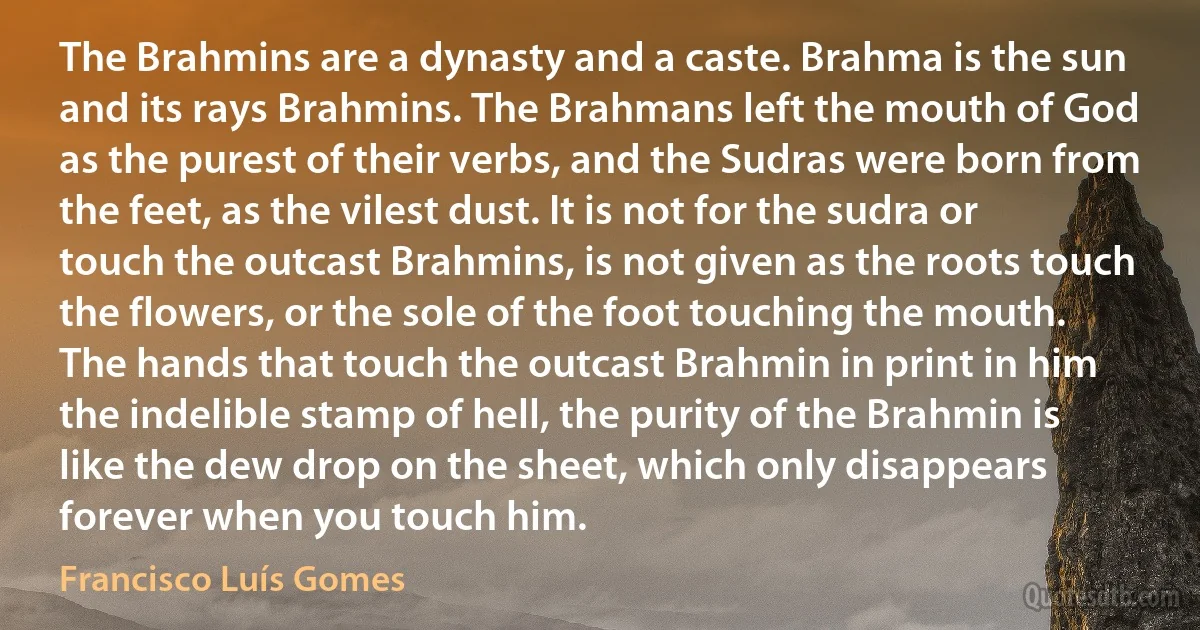Brahma Quotes
Guru Purnimma is also called Vyasa Purnimna. On this day Bhagavan Veda Vyasa was born to sage Parashara and a fisherwoman. On this day Bhagavan Vedavyasa is said to have commenced the great work Brahma Sutra. Hence this day is also dedicated to the study of Brahma Sutra. He represents the entire Guru Parampara and he is worshipped very well.

Vyasa
Veda Vyas did not possess four faces, yet he was like Brahma. He did not have four hands yet he acted like Vishnu. He did not have third eye and yet he was like Shiva. "I bow to Vishnu embodied in Vyas and Vyas embodied in Vishnu. One who enriched India through his speech, I bow to thee O Veda Vyas, the poet and creator of destiny and the knower of all.

Vyasa
But none of this criticism of science makes religion even a tiny bit more credible...
In contrast, religion has never been right in its claims about the universe-at least not in a way that all rational people can accept. There is no reliable method to show that the Trinity exists, that God is loving and all-powerful, that we'll meet our dead relatives in the afterlife, or that Brahma created the universe from a golden egg. Lacking a way to show its tenets are wrong, religion cannot show them to be right, even provisionally.

Jerry Coyne
In every third world age (Dvapara), Vishnu, in the person of Vyasa, in order to promote the good of mankind, divides the Veda, which is properly but one, into many portions. Observing the limited perseverance, energy, and application of mortals, he makes the Veda fourfold, to adapt it to their capacities; and the bodily form which he assumes, in order to effect that classification, is known by the name of Veda-vyasa. Of the different Vyasas in the present Manvantara and the branches which they have taught, you shall have an account. Twenty-eight times have the Vedas been arranged by the great Rishis in the Vaivasvata Manvantara... and consequently eight and twenty Vyasas have passed away; by whom, in the respective periods, the Veda has been divided into four. The first... distribution was made by Svayambhu (Brahma) himself; in the second, the arranger of the Veda (Vyasa) was Prajapati...

Vyasa
Right thought is necessary to right conduct, right understanding to right living, and the Divine Wisdom – whether called by its ancient Sanskrit name of Brahma Vidyā, or its modern Greek name of Theosophia, Theosophy – comes to the world as at once an adequate philosophy and an all-embracing religion and ethic. It was once said of the Christian Scriptures by a devotee that they contained shallows in which a child could wade and depths in which a giant must swim. A similar statement might be made of Theosophy, for some of its teachings are so simple and so practical that any person of average intelligence can understand and follow them, while others are so lofty, so profound, that the ablest strains his intellect to contain them and sinks exhausted in the effort.

Annie Besant
"Three days after this, the king entered Jhain at midday and occupied the private apartment of the rai... He then visited the temples, which were ornamented with elaborate work in gold and silver. Next day he went again to the temples, and ordered their destruction, as well as of the fort, and set fire to the palace, and ‘thus made hell of paradise'... While the soldiers sought every opportunity of plundering, the Shah was engaged in burning the temples, and destroying the idols. There were two bronze idols of Brahma each of which weighed more than a thousand mans. These were broken into pieces and the fragments distributed amongst the officers, with orders to throw them down at the gates of the Masjid on their return.”65.

Amir Khusrow
O the one who from whom there was pain on the head of the [Jayanta] crow (kākakāka); O the one from whom there is pleasure in [all] beings (kaka); please come, please come (āka āka); O the one from whom there is pleasure for Sītā (kukāka); please come (āka); O the one from whom there is pleasure for the universe (kaka); please come (āka); O Lord (ka); O one who invites to himself those who find pleasure in the [mortal] world (kukaka); please come, please come (āka āka); O the one from whom there is pleasure for both Brahmā and Viṣṇu (kāka); please come (āka); O the one from whom there is pleasure on the earth (kauka); please come, please come (āka āka); O the one who is called out to [for protection] by the evil crow [Jayanta] (kukākaka), [please come]. ॥ 20.93 ॥.

Rāmabhadrācārya
The Supreme God (kaḥ) (Rāma) [is resplendent] on [both] the earth (kau) and in Sāketaloka (ke); from him there is pleasure in the universe and in the sound of the peacock (kekakekākaḥ); he takes pleasure and bliss in the caw of the [Kākabhuśuṇḍi] crow (kākakākākakaḥ); from him there is pleasure for all the worlds (kakaḥ); for him the pain [of exile] is a pleasure (kākaḥ); his crow ([Kākabhuśuṇḍi]) is praiseworthy (kākaḥ); from him there is pleasure for Brahmā (kakaḥ); he calls out [to the devotees] (kākaḥ); from him there is pleasure for Kukā or Sītā (kukākaḥ); he calls out to the [Kākabhuśuṇḍi] crow (kākakaḥ); and from him there are worldly fruits and the bliss of liberation (kukaḥ). ॥ 20.92 ॥.

Rāmabhadrācārya
Hinduism is a religion of violence. All Hindu gods killed their enemies and became heroic images. This is the only religion in the world where the killer becomes god. Whom did they kill? From Brahma to Krishna, those who were killed were Dalitbahujans. Now these images and the stories and narratives and everything is out there in the civil society. Now, because of this, the consciousness of worshipping the killer or worshipping violence did not give any space for human rights. So my question is the human rights discourse must start with an anti-warrior position.

Kancha Ilaiah
The idea of God is a form of the idea of the Infinite. As long as the mystery of the infinite weighs on human thought, temples will be erected for the worship of the Infinite, whether God is called Brahma, Allah, Jehovah, or Jesus; and on the pavement of these temples, men will be seen kneeling, prostrated, annihilated by the thought of the Infinite.

Louis Pasteur
An Englishman who, by a most careful investigation into the various representations, has sought to discover what is meant by Brahma, believes that Brahma is an epithet of praise, and is used as such just because he is not looked on as being himself solely this One, but, on the contrary, everything says of itself that it is Brahma. I refer to what Mill says in his History of India.

Georg Wilhelm Friedrich Hegel
Oh friend! Brahma Jnana means realisation of Self (Atma). There is no difference between Atma and God. If you want to realise Atma in your body, then you have to surrender to God the following five things: five pranas, five senses, mind, intellect and ego. All these are inside a person. It is easy to surrender the external things. But to surrender those which are inside a person is very difficult. It is like walking on the edge of a sharp knife. Those who cannot surrender even the external things are deemed to be fully under delusion. Such persons cannot understand the five inside matters.

Sai Baba of Shirdi
...The rise, triumph, and victory of Spinozism in Europe are reminiscent of the power of ancient Buddhism because both are religiosity rather than philosophy. Spinozism is religion even when it operates with bizarre formulas. Its starting-point is a dead God, who is reminiscent of Buddha's Brahma. It is man's metaphysical fear and not the idea of a living God which is the driving force in religiosity. True religiosity is not an understanding of how God is correlated to man and to the world but the feeling of man's insignificance in the cosmos, giving birth to a state of meekness, humbleness, compassion, and pity. Only when man is crushed and overwhelmed by the thought of his insignificance in this vast universe does he become truly religious. These feelings are as present in Spinozism as they are in Buddhism.

Baruch Spinoza
That which we know as Yoga is the method by which evolution is quickened in the individual, and all the powers of the Self, up to the threshold of divinity, may by it be brought into manifestation in the man of the present. That is why Yoga training was necessary for the ancient scientist; he must develop in himself the three aspects of God, if he were to understand them as manifested in the universe around him. Now, at our own stage of evolution, it is specially the life of Brahmâ-or the Brahmâ aspect of God-with which the human mind is coming into touch, because the mind in man is the reflection of the universal mind in Kosmos. That life is the life that is the force in the atom, that vivifies every atom, nay, that brings the atom into existence, as we shall see, and remains during the whole of the growth of the universe as the fundamental life that keeps those atoms as active particles building up innumerable forms.

Annie Besant



